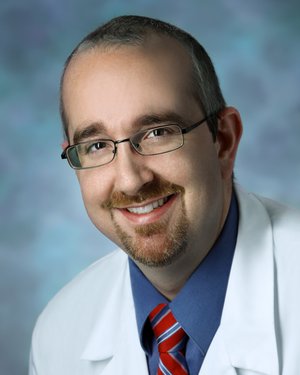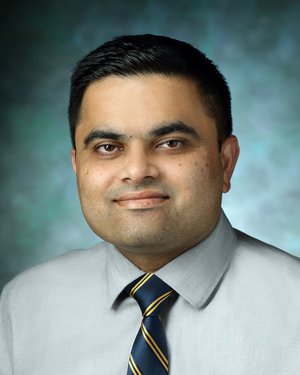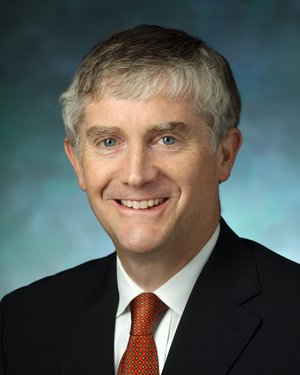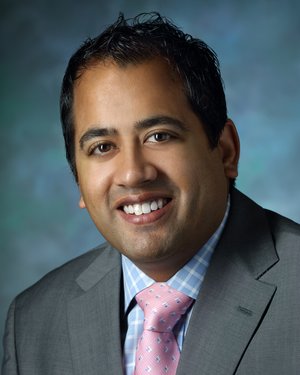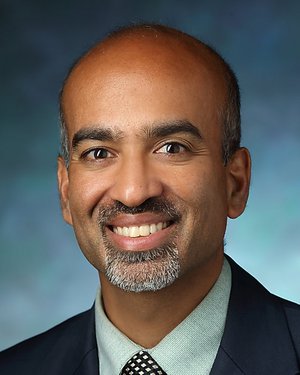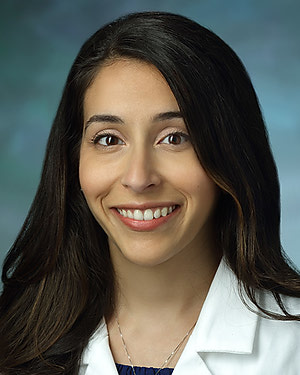Neuroimmunology and Neurological Infectious Disease Fellowship
The Johns Hopkins Fellowship in Neuroimmunology and Neurological Infectious Disease aims to develop exceptional independent investigators equipped with the knowledge to address critical questions related to the epidemiology, natural history, pathogenesis, and therapy of neuroimmunological diseases and neurological infectious diseases. The program offers training in a broad spectrum of neuroimmunological diseases, along with intensive hands-on research experience, close relationship with mentors, and a unique training environment. A more focused fellowship of neurological infections is not offered every year, so please reach out to the program coordinator prior to submitting a full fellowship application.
On this page: Program Information | Directors | Eligibility | Institutional Resources | Faculty | Current Fellows
Fellowship at a Glance
- Duration: 2-3 years (we also occasionally offer one-year clinical fellowships)
- Important dates:
- Program start date: July 1
- Application period: please check the SF match website
- Interviews: approximately December - February/March
- Each fellowship application/interview cycle is done approximately two years in advance of the anticipated fellowship start date (e.g., fall/winter 2024 applications are for July 2026 start date)
- Focus: Depends on the fellowship track
- Eligibility: board-eligible or board-certified neurologists
Fellowship Tracks and How to Apply
Our fellowship offers a range of specialized tracks for those interested in advancing their careers in neuroimmunology. You may apply to multiple tracks:
- Neuroimmunology/MS Clinical Track: Applications for this track are accepted through the SF Match website. The platform serves as a hub for matching prospective fellows with the right programs across numerous medical specialties. For specific questions regarding this track, please contact our program coordinator, Dr. Kruse-Hoyer at mkruseh1@jhmi.edu.
- Neuroimmunology/MS Combined Clinical and Research Track: Applications for this track are accepted through the SF Match website. For specific questions regarding this track, please contact our program coordinator, Dr. Kruse-Hoyer at mkruseh1@jhmi.edu.
- Myelitis and Myelopathies Track: Please contact David Acero-Garces at dacerog1@jh.edu for information on how to apply.
Program Coordinator
Mason Kruse-Hoyer, MD, MA
(443) 478-3375
mkruseh1@jhmi.edu
Program Director
Associate Program Directors
-
Ellen Mowry, MD
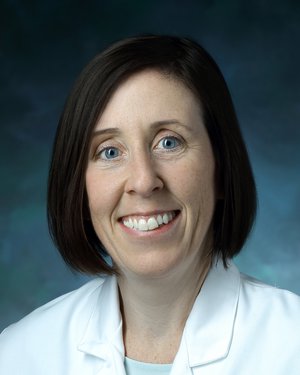
- Director, Multiple Sclerosis Experimental Therapeutics Program
- Professor of Neurology
-
Bardia Nourbakhsh, MD
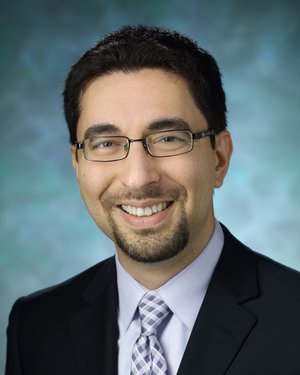
- Associate Program Director, Neuroimmunology and Neurological Infectious Disease Fellowship
- Associate Professor of Neurology
Program Features
-
- Fellows will become experts in evaluating and comprehensively managing patients with neuroimmunological diseases.
- Fellows will participate in specialty clinics, including multiple sclerosis (MS), neuromyelitis optica spectrum disorders (NMOSD), myelopathies (e.g., transverse myelitis), stiff person syndrome spectrum disorders (SPSD), neurosarcoidosis, and neuro HIV clinics, with an opportunity for additional clinical exposure to encephalitis, neuro-vestibular, neuro-ophthalmology, neuroradiology, neuropathology, neurology infusion center, neurourology, neuro-rehabilitation (including neuropsychology, botulinum toxin injections, etc.), and other available clinics.
- Fellows participate in the inpatient Neuroimmunology and Neurological Infections (NINI) consult service, which provides a service to inpatient hospital patients who need specialized expertise in the workup and/or management of NINI diseases. The NINI consult service is most often contacted for suspected or definite conditions that primarily affect the central nervous system and are immune- or –infectious in origin. Examples of such conditions include newly diagnosed MS, NMOSD, myelin oligodendrocyte glycoprotein antibody disorders (MOGAD), optic neuritis, transverse myelitis, encephalitis, SPSD, neurosarcoidosis, etc.
-
- Fellows get exposure to current scientific issues and research approaches used in studying immune disorders and neurological infectious diseases. This is accomplished through a collaborative faculty network, formal research seminars, and informal presentations of work-in-progress, journal reviews, and didactic lectures. These intellectually stimulating experiences encourage the use of expertise across disciplines and facilitate collaborative thinking, leading to the development of productive scientific careers in either clinical and/or basic science research.
- Fellows will also have the opportunity to participate in active clinical research nationally as well as international research programs in neuroinfectious diseases in Africa, if available.
- Many fellows choose to take didactic courses in biostatistics, bioethics, epidemiology, clinical trial design, grant writing workshops, neuroimmunology and neurovirology. Those courses are offered through the Johns Hopkins School of Medicine and the Johns Hopkins Bloomberg School of Public Health.
-
- NINI Fellows Summer Crash Course | Tuesdays (weekly during summer)
- NINI Fellows Lecture Series | Tuesdays (every other week, after summer course)
- Neuroimmunology Seminar Series | Tuesdays (alternating weeks with NINI lecture series)
- Joint NIMH Center Seminar Series (neuroHIV/comorbidities research; nationwide conference) | Wednesdays (virtual)
- Neuroimmunology Case Conference | Thursdays (weekly)
- Neurology Grand Rounds | Thursdays (weekly outside of summer)
- MRI in MS seminar | Fridays (monthly)
- National MS Society Case Conference Proceedings | Monthly
- NINI Fellows Journal Club | Monthly
Fellows attend a minimum of one national/international conference each year (e.g., American Academy of Neurology, the American Neurological Association, the Consortium of Multiple Sclerosis Centers, the Americas Committee for Treatment and Research in Multiple Sclerosis, the European Committee for Treatment and Research in Multiple Sclerosis). Fellows have the opportunity to put together and present abstracts (posters and/or platform presentations, if accepted) at these conferences.
Myelitis and Myelopathies Fellowship Track
-
Myelitis and myelopathies are non-traumatic disorders of the spinal cord that produce overwhelming functional disturbances, disability and profound disruption of normal life. They may affect people at any age and can produce a wide range of motor and sensory disturbances, mobility disruptions and pain symptoms. Although the diagnosis is rare, people living with these disorders often experience long-term consequences that diminish their quality of life. Subsequent to an initial attack, only one-third of people will recover with little or minor symptoms, while the rest will continue to have moderate to significant disabilities throughout their lives.
More than 1,400 new non-traumatic spinal cord disorder diagnoses are made annually in the United States; however, due to misdiagnosis and underdiagnosis, the prevalence of myelitis and myelopathies is likely underreported. While inflammation of the spinal cord—coined “transverse myelitis”—has been the focus as the main cause of non-traumatic spinal cord problems, recent research conducted at Johns Hopkins and elsewhere has uncovered a variety of causes including autoimmune, infectious, and even vascular diseases. Identifying the causative factors associated with these disorders is critical to determine the proper treatment and improve the lives of patients.
-
The Johns Hopkins Myelitis and Myelopathy Center (JHMMC) was the first center in the world established to facilitate optimal diagnosis, management, research and education on acute and chronic non-traumatic spinal cord disorders. Since its inception in 1999, the center has deployed the individualized evidence-based diagnosis and care model to achieve the fundamental goal of improving the diagnosis and management of myelitis and myelopathies. In conjunction with comprehensive clinical care, the JHMMC serves as a hub for clinical and basic research, patient education and training of the future generation of neurologists, with the ultimate goal of optimal recovery of patients with myelitis and myelopathies.
Patient Care: The JHMMC implements a multidisciplinary approach to provide comprehensive and timely evaluation and diagnosis of patients with myelitis and myelopathies in the United States and the world. Depending on the person’s needs, they are evaluated and treated by specialty experts including neurology, neurosurgery, radiology, neurorehabilitation and urology providers.
The JHMMC has a robust collaboration with the Kennedy Krieger Institute, as well as rehabilitation colleagues across the Johns Hopkins enterprise, including physical and occupational therapists specializing in non-traumatic spinal cord disorders.Research: Clinical research centered on studies of the risk factors and epidemiology of myelopathies and myelitis, and strategies to improve diagnosis and treatment have been a major focus of the JHMMC. In the past few years, studies led by the center have contributed to a better understanding of inflammatory disorders of the spinal cord such as neuromyelitis optica spectrum disorder, myelin oligodendrocyte glycoprotein antibody-associated disease, neurosarcoidosis, and demyelinating spinal cord disorders, including MS. The critical roles of vascular risk factors in the presence of non-traumatic spinal cord disorders have been well described by the center’s clinical studies, which emphasize the need for identifying such risks and timely treatment. Their work has had a significant impact on the way patients are diagnosed and managed. In addition, studies for identification of biomarkers of diagnosis and pathogenesis of non-traumatic spinal cord disorders using neuroimaging techniques and cerebrospinal fluid analysis have contributed to differentiating the many causes of those disorders.
Education and Training: The JHMMC is the nucleus in the United States for education of clinicians and scientists committed to improving diagnosis, treatment, and understanding of myelitis and myelopathies.
Eligibility Criteria
The minimum qualifications to apply to this fellowship program are:
- Satisfactory completion of a residency in neurology or pediatric neurology
- M.D. license (or equivalent) is required for this fellowship program
U.S. and international applicants (ECFMG sponsored J-1 visa) can apply. All applicants are encouraged to obtain funding in the form of MS Society grants, AAN (American Brain Foundation) fellowship grants, institutional resources, and other funding opportunities. Program directors and primary mentors help with the process of obtaining fellowship funding.
Applicant Selection
When all applications have been received, the program directors and executive committee will review each application and distribute to pertinent reviewers based on the training program track. Once all applications have been reviewed, a meeting will be held to discuss the applicants. The strongest applicants will be identified and final selections will be made for interviews during December -February/March. The applicants will be ranked and chosen by the program directors and executive committee by the SF Match rank list deadline. Selected applicants will begin training by July 1 the following year.
Institutional Resources
- The Johns Hopkins NIMH Center for Novel Therapeutics of HIV-associated Cognitive Disorders
- The Johns Hopkins Center for AIDS Research (CFAR)
- Bloomberg School of Public Health
- Welch Center for Prevention, Epidemiology and Clinical Research
- The Johns Hopkins Center for Global Health
- Graduate Training Program in Clinical Investigation
Fellowship Faculty
Clinical Faculty
-
Michael D. Kornberg, MD PhD
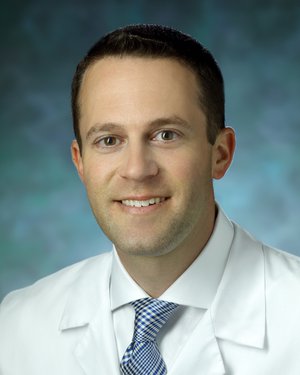
- Associate Director, Neurology Residency Program
- Assistant Professor of Neurology
-
Justin Charles McArthur, MBBS
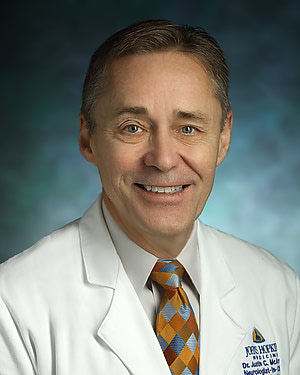
- Director, Johns Hopkins Department of Neurology
- Professor of Neurology
Research Faculty
Affiliated Faculty
- Philippines Garcia Cabahug, M.D.
- Seyed Ali Fatemi, M.D.
- Daniel Ross Gold, D.O.
- Abbey Hughes, Ph.D., M.A.
- Neil R Miller, M.D.
Current Fellows
First-Year Fellows
Ahmed Al-Saadi, MD
Neurology: McGill University (2019-2024)

Asli Buyukkurt, MD
Neurology: McGill University (2019-24)

Angeliki Filippotou, MD
Internal Medicine: MedStar Union Memorial Hospital (2020-21)
Neurology: Johns Hopkins Hospital (2021-24)

Florina Kraiter, DO
Internal Medicine: Duke University (2020-21)
Neurology: Duke University (2021-24)

Munther Queisi, MBBCh
Internal Medicine: University of Massachusetts (2018-21)
Neurology: University of Chicago (2021-24)

Daniela Riveros-Acosta, MD
Internal Medicine: Mt. Sinai (2020-21)
Neurology: Mt. Sinai (2021-24)

Second-Year Fellows
Aisha Elfasi, MD
Neurology: University of Florida (2019-23)

Karla Gray-Roncal, MD
Internal Medicine: New York University (2019-20)
Neurology: Johns Hopkins Hospital (2020-23)

Jonathan Krett, MD
Neurology: University of Calgary (2018-23)


